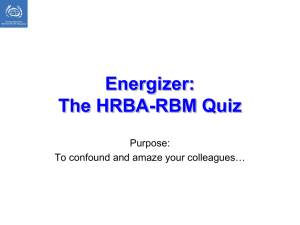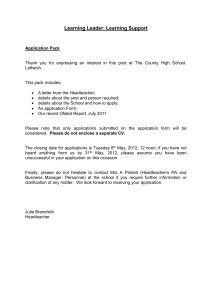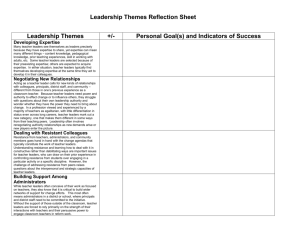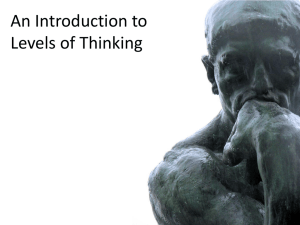UNIVERSITY LEADERSHIP AND MANAGEMENT
advertisement
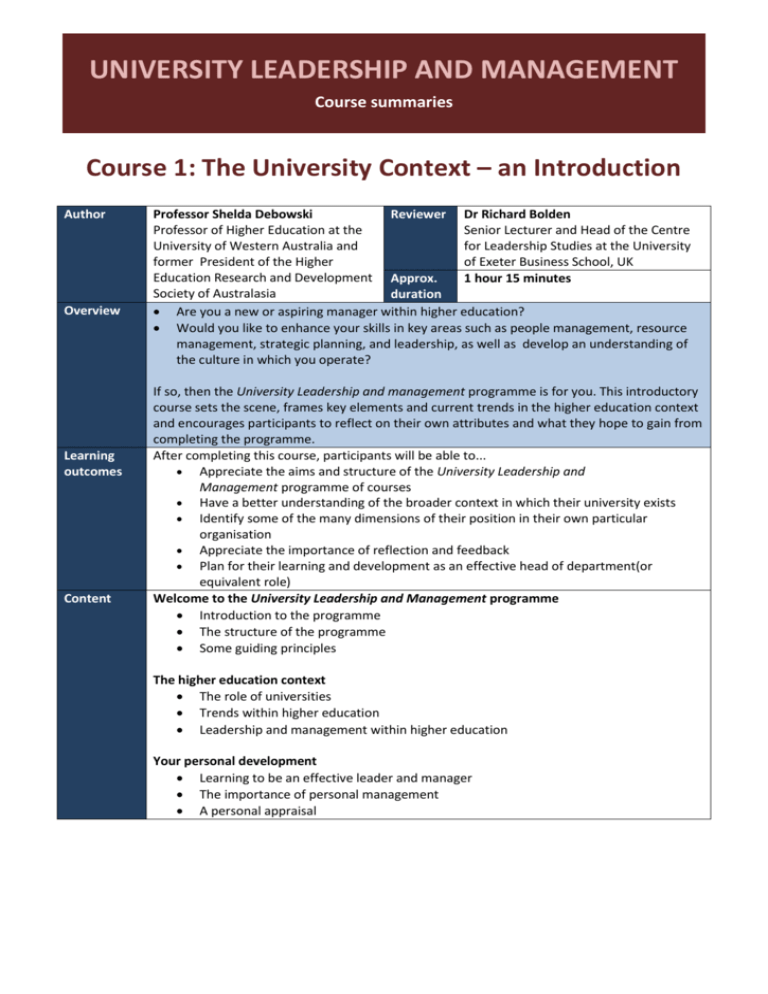
UNIVERSITY LEADERSHIP AND MANAGEMENT Course summaries Course 1: The University Context – an Introduction Author Overview Learning outcomes Content Professor Shelda Debowski Reviewer Dr Richard Bolden Professor of Higher Education at the Senior Lecturer and Head of the Centre University of Western Australia and for Leadership Studies at the University former President of the Higher of Exeter Business School, UK Education Research and Development Approx. 1 hour 15 minutes Society of Australasia duration Are you a new or aspiring manager within higher education? Would you like to enhance your skills in key areas such as people management, resource management, strategic planning, and leadership, as well as develop an understanding of the culture in which you operate? If so, then the University Leadership and management programme is for you. This introductory course sets the scene, frames key elements and current trends in the higher education context and encourages participants to reflect on their own attributes and what they hope to gain from completing the programme. After completing this course, participants will be able to... Appreciate the aims and structure of the University Leadership and Management programme of courses Have a better understanding of the broader context in which their university exists Identify some of the many dimensions of their position in their own particular organisation Appreciate the importance of reflection and feedback Plan for their learning and development as an effective head of department(or equivalent role) Welcome to the University Leadership and Management programme Introduction to the programme The structure of the programme Some guiding principles The higher education context The role of universities Trends within higher education Leadership and management within higher education Your personal development Learning to be an effective leader and manager The importance of personal management A personal appraisal Course 2: Leadership and Management Author Professor Robert Birnbaum Professor Emeritus of Higher Education at the University of Maryland Overview Learning outcomes Content Reviewer Dr Rajani Naidoo Director of the PhD Business Administration in HE Management, University of Bath Approx. duration 3 hours Do you have what it takes to be a leader or manager within higher education? Do you have to chair department meetings and make key decisions? Have you reflected on your approach to leadership and maintaining influence? This course helps heads answer the basic question ‘What do I do, and how do I do it?’ by introducing a wide range of research findings and professional experiences, and encouraging reflection on their own views and approaches. It looks at areas such as decision-making, maintaining influence, cognitive bias and the importance of communication as well as the nature of leadership and management and key elements of good practice. After completing this course, participants will be able to: Appreciate how management and leadership processes in colleges and universities differ from those in other organizations Understand how different sources of authority available to managers and to leaders in higher education affect what you can do, and how you can do it Apply some principles and techniques to increase their effectiveness in an academic, professional environment Learn how influence can be gained and lost, and what can be done over time to maintain influence with colleagues and within the institution Gain insight into how and why true leadership promotes collegiality, trust, motivation, and departmental accountability. Introduction to academic management and leadership Do you have what it takes? The head in the middle What department members do, and don't, want Why universities are different Making decisions in a university Academic management and academic leadership Four ways to read a university – and yourself Becoming an effective academic manager To be or not to be: Weighing the costs and benefits Academic management tasks Managing the department meeting Management made simple Becoming an effective academic leader The nature of leadership How departments select their leaders Leaders and followers: The fair exchange Developing a personal philosophy of leadership Leadership styles Leadership made (relatively) simple Maintaining influence The sources and consequences of social power The need for intelligence(s) and communications Being true to yourself Avoiding cognitive bias Seven key lessons for managers and leaders Course 3: University Cultures and Organisational Management Author Overview Learning outcomes Content Professor Shelda Debowski Reviewer Carol Bolton Professor of Higher Education at Organisational Development Manager the University of Western Australia at the University of Liverpool and former President of the Higher Approx. 3 hours Education Research and duration Development Society of Australasia What do you consider to be the ‘culture’ at your university and within your own department? Have you thought about benefits which your department could gain from positive adjustments to its cultural dynamic? Would you like to be equipped with the tools and confidence to manage difficult working relationships within your department? This course helps heads explore the culture within which they work and understand its implications for the way they plan and develop their department. It investigates the features of higher education cultures and knowledge communities, social and professional identity, the psychological framework, how to deal with difficult cultures, conflict resolution, bullying and inclusion. After completing this course, participants will be able to: Explain the impact of values and beliefs on university culture Apply strategies that will contribute to a productive and constructive university culture Identify the causes and impacts of different behaviours within a university community Ensure all members of your community experience a safe, rewarding and motivating work environment Identify and address behaviours or practices that are destructive or counter-productive Lead change initiatives and transitions with confidence. Understanding university cultures What is culture? Are universities really different? Stakeholder expectations of academic communities Defining academic culture Social and professional identity Strong and weak cultures Competing values framework Leading organisational change Types and levels of change Leading cultural shifts Why things stay the same Undertaking a cultural audit The transition process Implementing change Consulting with your colleagues Building an effective organisational culture Knowledge communities Managing constructively Balancing productivity and innovation Managing up and across Being inclusive Dealing with conflict in your department Case study: when things go wrong Resolving conflict Bullying You are not alone: sources of support Course 4: Strategic planning Author Overview Learning outcomes Content Professor Peter McCaffery Deputy Vice Chancellor at London Metropolitan University. Author of The Higher Education Manager’s Handbook (Routledge, 2010) Reviewer Associate Professor Mark Brown Director: Teaching, Learning and Distance Education at Massey University, New Zealand 2 hours Approx. duration Are you responsible for developing your department’s strategic plan? Would you like further support with how to understand, develop, implement and review your strategic plan? This course supports heads in developing a strategic plan for their department that is collectively owned by colleagues and can be used as a means of securing necessary change and improvement. It considers the value and purpose of strategic planning, the planning process, envisioning, scanning, analysis, consultation, key performance indicators, risk management and – crucially – implementing and monitoring the plan. After completing this course, participants will be able to: Review your own leadership and management approach and identify areas to enhance your effectiveness in strategic planning and implementation Understand the principles of strategic planning and how to apply them in your academic environment Develop a strategic plan that is collectively owned by colleagues throughout your department and is consistent with your institutional strategic objectives Understand and recognize the strengths and limitations of different approaches to strategic implementation, and how to secure lasting change that improves departmental performance. The role of strategic planning The value and purpose of strategic planning Strategy management in your university The strategic planning process Envisioning your initial role in the strategic planning process Case studies: envisioning in practice Developing the strategic plan Scanning your university’s environment Traditional v. new higher education Scanning and analysing your department’s environment Building a SWOT analysis Consulting and engaging your colleagues Consulting others beyond your department and achieving strategic fit Identify key performance indicators Assessing and managing risk Implementing your strategic plan Deciding your approach to implementation Engaging and communicating with your colleagues When strategic implementation goes wrong: lessons from failure When strategic implementation goes right: lessons from success Leading strategic implementation Integrating effective planning Monitoring your strategic plan Reviewing and revising your strategic plan Course 5: Managing people Author Overview Learning outcomes Content Professor Peter McCaffery Deputy Vice Chancellor at London Metropolitan University. Author of The Higher Education Manager’s Handbook (Routledge, 2010) Reviewer Margaret Orr Director of the Centre for Learning, Teaching and Development at the University of the Witwatersrand, Johannesburg. 3 hours Approx. duration Do you feel confident in your ability to establish and motivate a well-performing team? Are there any parts of your team-building approach which you think would benefit from some expert advice? This course aims to help heads establish a well-motivated and high-performing department. It encourages participants to reflect on and develop their own particular approach to managing people, as well as offering tips and advice on recruitment, induction, team-building, motivational climate, performance review, staff development, diversity and handling difficult situations. After completing this course, participants will be able to: Review your own leadership and management behaviour and identify areas to enhance your effectiveness in managing people Understand the theory and principles of motivation and performance management, and how to apply them in your own academic environment to establish and sustain high performance among the individuals and teams in your department Approach the difficult situations you will face in your role knowing how you can improve working relationships, service and performance Understand and realize the full potential of staff development to enhance individual and departmental performance Apply the principles of diversity to make the best use of people's differences for the benefit of the individual and the department The HR challenge for HE managers The university as a working environment Your approach to managing people Motivating staff Understanding and improving your university’s motivational climate Motivation and trust Case study: What does a well-motivated and high-performing department look like? Putting motivational theory into practice Recruiting and inducting staff Some common pitfalls Job descriptions and person specifications The selection process The induction process Managing for high performance Principles and challenges Establishing and reviewing performance standards Managing difficult situations Tackling poor performance Handling complaints, discipline and grievances Managing redundancies Developing staff The learning organization Understanding and valuing staff development Establishing a learning climate in your department Effective team-building Understanding and valuing diversity Celebrating and leading diversity Course 6: Managing resources Authors Overview Professor Margaret Barr Professor emeritus in the School of Education and Social Policy at Northwestern University. Professor George S. McClellan Vice Chancellor for student affairs at Indiana University – Purdue University Fort Wayne (IPUFW) Learning outcomes Content Reviewers Professor Donald E. Helller Professor of Education and Senior Scientist, and Director of the Center for the Study of Higher Education at The Pennsylvania State University. Professor Peter McCaffery Deputy Vice Chancellor at London Metropolitan University 2 hours Approx. duration Are you responsible for effectively setting and monitoring your department budget? Have you ever felt that there must be a more effective way to manage the administrative and financial aspects of your job? Would you benefit from expert tips for professional and ethical practice in the context of resource management? This course focuses on helping heads of department become more effective as managers of the fiscal and facilities resources available to them. It covers the roles and responsibilities of a department head in this regard, revenue, expenses, budgeting models and management, facilities management as well as how to build relationships with key individuals, units and offices within your institution. After completing this course, participants will be able to: Identify the responsibilities and roles of a department manager Understand the relationship of governance, mission, strategic plan, and resource management Recognise revenue and expenses as the two key considerations in the management of financial resources and recognize common sources of revenue and common categories of expense in higher education Understand the broad construct of budgets and budgeting, the processes of developing and managing a budget, and the annual budget cycle Comprehend operational and fiscal considerations in facilities management Identify resource management as artful and ethical and identify practical tips related to its practice Responsibilities and roles of a department head Assessing departmental programmes and services Serving as an advocate Managing the expectations of those around you Identifying creative solutions Building and sustaining relationships Relationship of managing resources to governance, mission and strategic planning Governance Mission Strategic plan Understanding departmental finances Revenue Public and private institutions Expenses Managing departmental budgets Purposes and types of budgets Models of budgeting Budget development and reading budget documents Managing budgets and budget cycles Managing departmental facilities Operational considerations Financial considerations The art and ethics of resource management Practical tips for department managers
